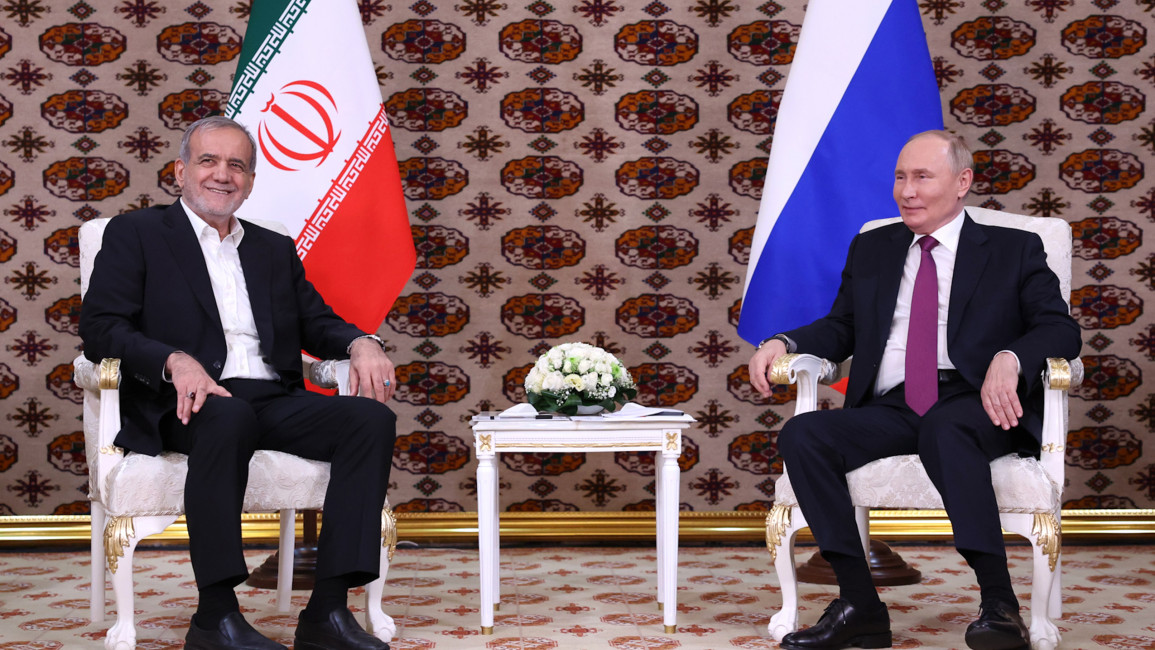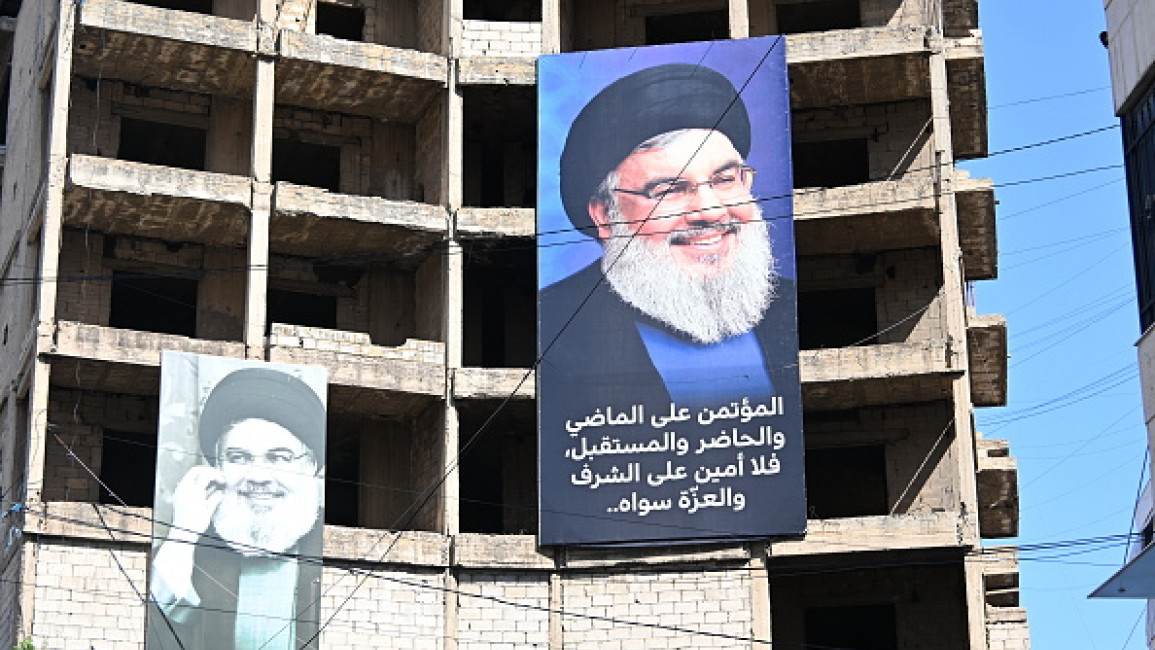
Will Russia be drawn into an Israel-Iran regional conflict?

On 11 October, Russian President Vladimir Putin met with his Iranian counterpart Masoud Pezeshkian in Ashgabat, Turkmenistan.
Pezeshkian’s meeting with Putin, which was his first since he triumphed in the July 2024 Iranian presidential elections, was accompanied by ebullient rhetoric.
Putin extolled Russia’s “very close” positions with Iran on international affairs. Pezeshkian, meanwhile, expressed optimism that a strategic partnership agreement would be signed at the BRICS Summit in Kazan later this month.
While close Russia-Iran relations are nothing new, the timing of Putin’s meeting with Pezeshkian raised eyebrows. After firing 180 ballistic missiles into Israel on 1 October, Iran is preparing for possible Israeli strikes on its oil infrastructure and nuclear sites.
As Iran has transferred drones and ballistic missiles to support Russia’s invasion of Ukraine, it is eyeing sophisticated Russian military technology. Su-35 fighter jets and S-400 air defence systems are rumoured to top Iran’s bucket list.
Due to the severe deterioration of its relationship with Israel since its February 2022 invasion of Ukraine, Russia could provide Iran with these technologies and clandestinely support Tehran’s militia allies. Russia also hopes that an intensified Israel-Iran conflict could deflect Western attention from Ukraine.
Nevertheless, Russia also has reasons to tread carefully. Russia does not want to see Syrian President Bashar al-Assad’s network of Iranian military assets degraded or witness a regional war’s spillover to the Gulf monarchies.
This means that Russia will likely help Iran as it sees fit while continuing to position itself as a voice of restraint on Tehran’s conduct.
Russia's potential military technology transfers to Iran
Since Iran began supplying Shahed and Mohajer UAVs to Russia in the fall of 2022, an implicit quid-pro-quo has undergirded the partnership. As Iran’s Air Force still relies on equipment that predates the 1979 Iranian Revolution and has plundered operational fighter jets for spare parts, Tehran hopes that its arms transfers will help it procure Su-35 jets.
An 8 October article in Iran’s Tabnak media outlet lionised the Su-35 as “an aerial phenomenon that has challenged the boundaries of physics” and extolled it as a “combination of pure power, operational simplicity and strategic flexibility”.
Iran’s hopes of obtaining the Su-35 jet have been complicated by delivery delays. In November 2023, Iranian Deputy Defence Minister Brigadier General Mahdi Farahi declared that plans had been finalised for the procurement of Su-35 jets, Mil Mi-28 attack helicopters and Yak-130 jets.
Farahi’s announcement was greeted with optimism in Tehran, as Iran had reportedly paid in full for Su-35 jets towards the end of Hassan Rouhani’s presidency. Russian media speculated that the Su-35 jet transfer would be a springboard for the eventual export of newer generation Su-57 jets to Iran.
Despite lofty expectations, Russia’s Su-35 jet deliveries to Iran did not transpire. Iran’s Khabar media outlet attributed the delay to Russia’s urgent need to transfer Su-35 jets to Ukraine’s frontlines. George Mason University Professor Emeritus Mark Katz linked the supply disruptions to Russia’s unwillingness to antagonise Saudi Arabia and the United Arab Emirates. As Iran seeks to counter Israeli air superiority, it wants this impasse to end.
|
|
Although Russia announced in June 2019 that it would be willing to sell the S-400 to Iran, these exports have not transpired. Iran’s focus on domestically producing analogues to Russia’s S-400, such as the Bavar-373, and Russia’s reticence about Iran transferring S-400s to Syria for use against Israel delayed these exports.
The threat of Israel striking Iran’s nuclear facilities and oil infrastructure made these transfers more urgent. It remains to be seen whether the reports that Russia sent S-400s and technical specialists to Iran in August have led to a tangible breakthrough.
Russia's prospective military assistance to Iran-aligned militias
Aside from fortifying Iran’s military arsenal, Russia is well-positioned to arm Hezbollah and the Houthis if it so chooses. In August 2006, an Israeli delegation visited Moscow to protest Hezbollah’s alleged use of Russian-made anti-tank missiles in the second Lebanon war.
Russia denied these allegations, but Moscow’s steady cooperation with Hezbollah in Syria and escalating tensions with Israel revived speculation about military-technical assistance to Hezbollah.
In November 2023, US intelligence reports claimed that the Wagner Group and Assad’s Syrian Arab Army had coordinated on SA-22 surface-to-air missile deliveries to Hezbollah. While these arms transfers have not been conclusively verified, Ukraine has accused Hezbollah commander Kamal Abu Sadiq of using Syria’s Shayrat military airfield to train Russian forces in UAV use.
This suggests a deeper military-technical relationship between Russia and Hezbollah, which could presage further arms transfers.
In recent months, there have been persistent reports that Russia might supply anti-ship missiles to the Houthis. One US official asserted that Saudi Crown Prince Mohammed bin Salman became aware of Russia’s potential delivery of anti-ship missiles ahead of Putin’s December 2023 visit to Riyadh and urged the Kremlin to nix these plans.
Nonetheless, Russian pro-war commentators like Vladimir Solovyov and Sergey Mardan have urged the Kremlin to arm the Houthis as retribution for NATO countries greenlighting Ukrainian strikes on Russian targets.
As Israel’s military campaign in Lebanon and a regional war loomed, speculation about Russian arms deliveries to the Houthis have intensified. Russia is reportedly mulling the sale of Yakhont P-800 Oniks anti-ship missiles to the Houthis.
These missiles would allow the Houthis to more precisely target US and European vessels. Viktor Bout, the notorious Russian arms dealer, has been an active participant in negotiations on anti-ship missile transfers to the Houthis.
These negotiations have not yet led to arms transfers. Russia’s reaffirmation of its support for Yemen’s internationally recognised government and decision to reopen its Aden embassy in early 2025 suggest that it has reservations about aligning with the Houthis.
How Russia sees a regionalised Israel-Iran conflict
Throughout the recent spiral of hostilities, the Kremlin has framed Israeli efforts to vanquish Iran’s Axis of Resistance as a futile exercise. A 9 October Russian Foreign Ministry statement claimed that Israeli strikes have not destroyed Hezbollah’s chain of command.
Former Kremlin advisor Sergey Markov described Iran’s missile barrage against Israel as a “fake” retaliation and warned of much more serious retributive Iranian strikes. Markov also expressed optimism that the US would be able to dissuade Israel from striking Iranian oil and nuclear facilities before the 5 November presidential elections.
Beneath this veneer of confidence, Russia has mixed feelings about the Israel-Iran conflict’s regionalisation. Ruslan Suleymanov, a Baku-based expert on Russian foreign policy towards the Middle East, correctly argues that Russia believes that Western support for Israel diverts resources away from Ukraine.
|
|
This view has been articulated by prominent Russian defence experts, such as Alexander Kots, and could encourage Moscow to provide small-scale arms shipments to Iran-aligned militias.
On the flip side, Russia sees risks in an uncontrolled escalatory spiral in the Middle East. Since January, Israel has carried out at least 104 attacks against Syria and has targeted arms depots and Islamic Revolutionary Guards Corps (IRGC) personnel that support Assad’s government.
The 8 October Israeli air attack on Damascus, which killed 13 people, suggests that Israel is intensifying its strikes on Hezbollah and Syria in a coordinated fashion.
Turkish President Recep Tayyip Erdogan has called for a coordinated retaliation by Russia, Iran, and Turkey against Israeli strikes on Syria. But it is unclear whether Russia can divert military resources from Ukraine to back Assad’s forces.
Russia’s condemnation of Houthi strikes on the UAE in early 2022 played a key role in crystallising Abu Dhabi’s neutral stance towards its invasion of Ukraine. As Russian exports to the UAE doubled after the Ukraine war and the UAE has risen to Russia’s seventh largest trade partner, the Kremlin does not want the Houthis to reignite hostilities against UAE-aligned separatist militias in southern Yemen.
These undesirable scenarios explain why Russia unsuccessfully tried to cool Israel-Iran tensions through diplomacy in April and might try to repeat that approach this time around.
On 18 October, Putin offered to mediate between Israel and Iran, as he wanted the “endless exchange of blows” to be stopped. Russian Deputy Foreign Minister Sergei Ryabkov simultaneously issued a pointed warning against potential Israeli strikes on Iranian nuclear facilities.
With its partnership with Israel in tatters and growing military dependency on Iran, Russia has fewer cards to play than in past crises.
Nonetheless, the Kremlin’s quest for diplomatic leverage in the Middle East will continue to intensify in the coming weeks.
Dr Samuel Ramani is an Associate Fellow at the Royal United Services Institute (RUSI) think tank and the CEO of Pangea Geopolitical Risk. Samuel is the author of two recent books on Russian foreign policy: Russia in Africa and Putin's War on Ukraine, and is a regular commentator on Middle East affairs for the BBC, Sky News, Al Jazeera, and CNN International
Follow him on Twitter: @SamRamani2





 Follow the Middle East's top stories in English at The New Arab on Google News
Follow the Middle East's top stories in English at The New Arab on Google News


